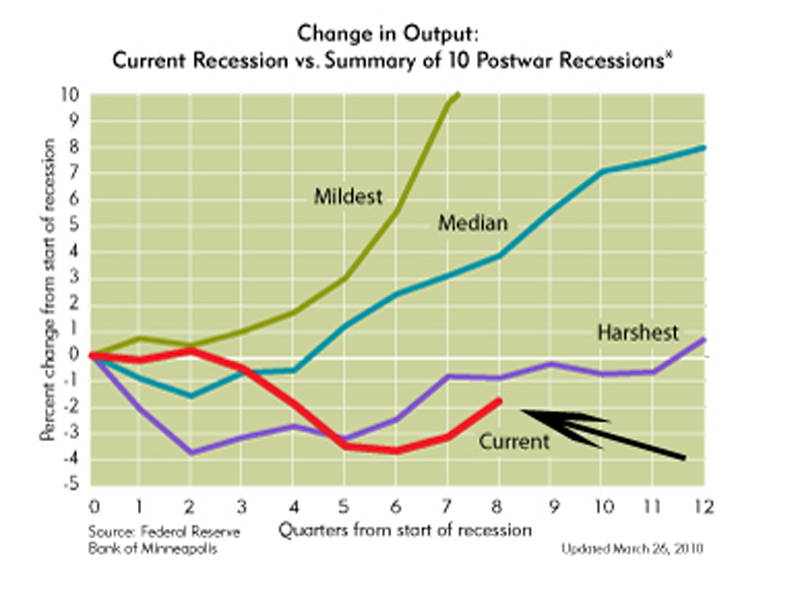The nascent upturn in the economy has economists cheering the end of the Great Recession, but the return of more than eight million lost jobs will take years, stoking fears that this will be a jobless recovery.
More than 8.2 million jobs have been lost since the recession officially began in December 2007. Male-dominated industries like construction and manufacturing have been hit particularly hard, leading some to dub this a 'mancession'. It's precisely those jobs that will take so long to recover, economists argue, because those skill-specific jobs are no longer available.
"In simple terms, the skills people have don't match the jobs available," Dennis P. Lockhart, president and CEO of the Federal Reserve Bank of Atlanta, said in a recent speech. "Coming out of this recession there may be a more or less permanent change in the composition of jobs."
"There's been a very, very deep recession, and there have been heavy job losses in the relatively unskilled parts of the labor force, such as construction," said Nigel Gault, chief U.S. economist for IHS Global Insight. "It's difficult for people who lose those types of jobs to find other jobs, especially if they require particular skills, which they don't have."
Nearly two million construction jobs have vanished since December 2007, according to data from the Bureau of Labor Statistics. More than 2.1 million jobs have been lost in manufacturing. Those industries are dominated by men.
"[T]he fall in men's employment is about 2.5 times that of women's," notes Howard J. Wall, an economist for the Federal Reserve Bank of St. Louis, in a recent St. Louis Fed publication.
Those jobs were lost in part because of the collapse of the housing market. With prices nationwide down nearly a third, foreclosures on the rise and a 'shadow inventory' of homes secured by defaulted mortgages just waiting to be foreclosed on and unleashed on the market, there's little need for further construction.
"There had been a bubble in construction prior to the downturn, and there's an awful lot of construction workers out there who can't find alternative work," said Sophia Koropeckyj, an economist and managing director for Moody's Economy.com who covers the labor market. "The same holds for manufacturing. It's hard [for those workers] to get reabsorbed into the labor market.
"In the past, when these highly-cyclical industries were affected, those people could find at least temporary work in things like retail," Koropeckyj said. "But because of the severity of the downturn in consumer industries, that option is no longer available."
Thus, it's taking longer and longer for those workers to find jobs. Nearly 44 percent of the unemployed have been jobless for at least six months -- an all-time high.
"The long-term unemployed are weighted towards men," Koropeckyj said. "Industries that employ a large proportion of men are being hurt, whereas industries that employ a large proportion of women -- like education and health care -- are being less affected by the downturn."
In fact, more than 880,000 jobs have been created in education and health services since the start of the Great Recession.
Two industries hit hardest by the recession -- financial services and construction -- also are the two industries that arguably were the biggest beneficiaries of the bubble. The financial industry has lost 628,000 jobs.
That shows that the "expansion was not really that strong in terms of employment," Koropeckyj said.
In a February speech, Federal Reserve Bank of San Francisco President Janet Yellen warned what the recovery will look like:
"The recession has forced businesses to reexamine just about everything they do with an eye toward restraining costs and boosting efficiency," said Yellen, who's expected to be President Barack Obama's pick to become the Fed's vice chairman. "Strapped by tight credit and plummeting sales, businesses have overhauled the way they manage supply chains, inventory, production practices, and staffing. Stores don't order merchandise unless they think they can sell it right away. Manufacturers and builders don't produce unless they have buyers lined up.
"My business contacts describe this as a paradigm shift and they believe it's permanent. This process of implementing new efficiency gains may have only begun and we may be in store for further efficiency improvements and high productivity growth for some time. If so, the rate of job creation will be frustratingly slow."
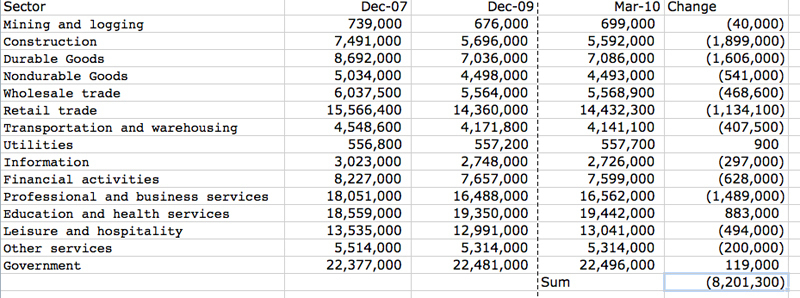
Source: HuffPost analysis of Bureau of Labor Statistics data
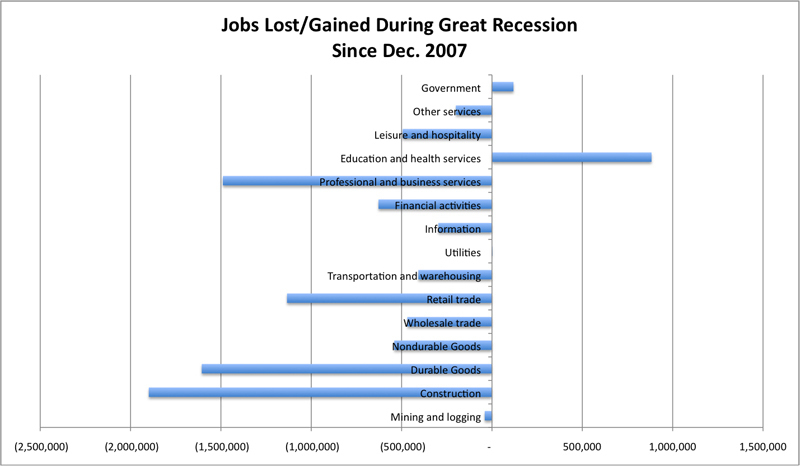
Source: HuffPost analysis of Bureau of Labor Statistics data
The Current Recession Compared To Past Recessions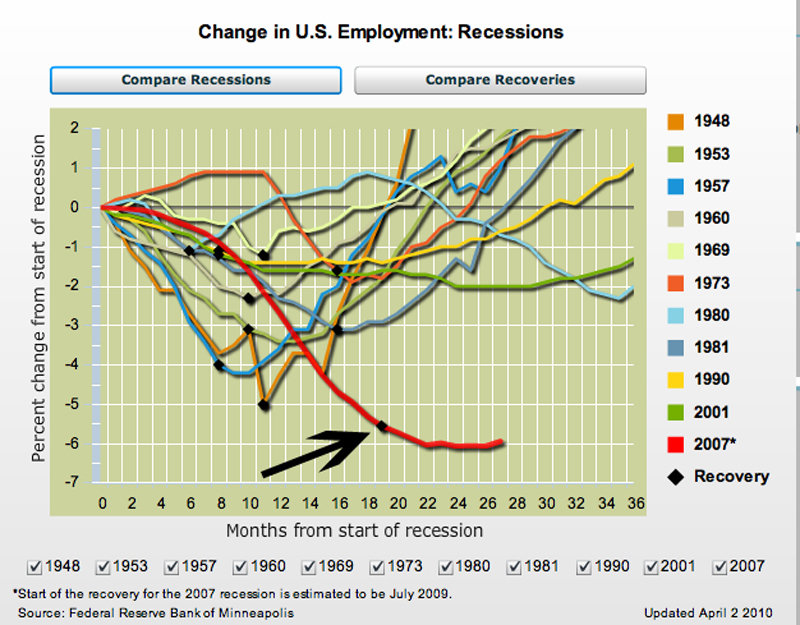
The Current Recovery Compared To Past Recoveries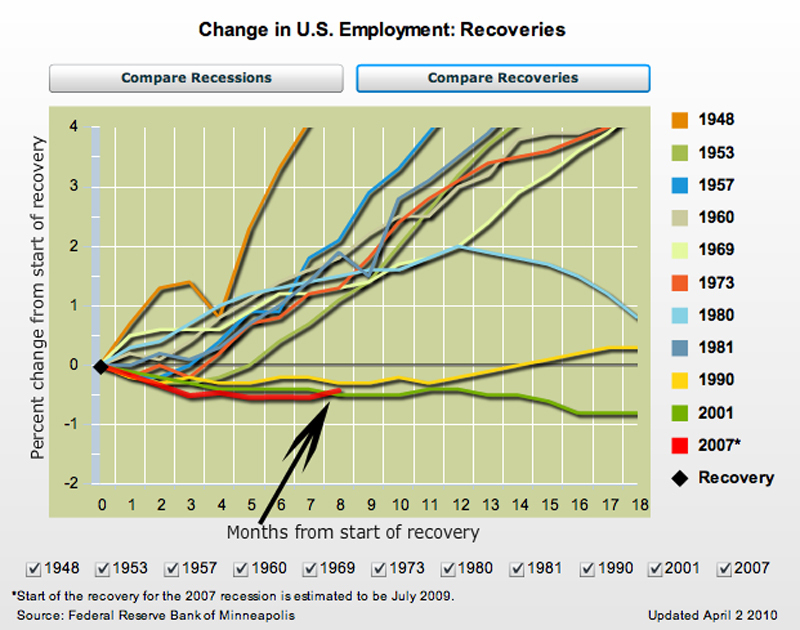
How Employment In This Recession Compares To Past Recessions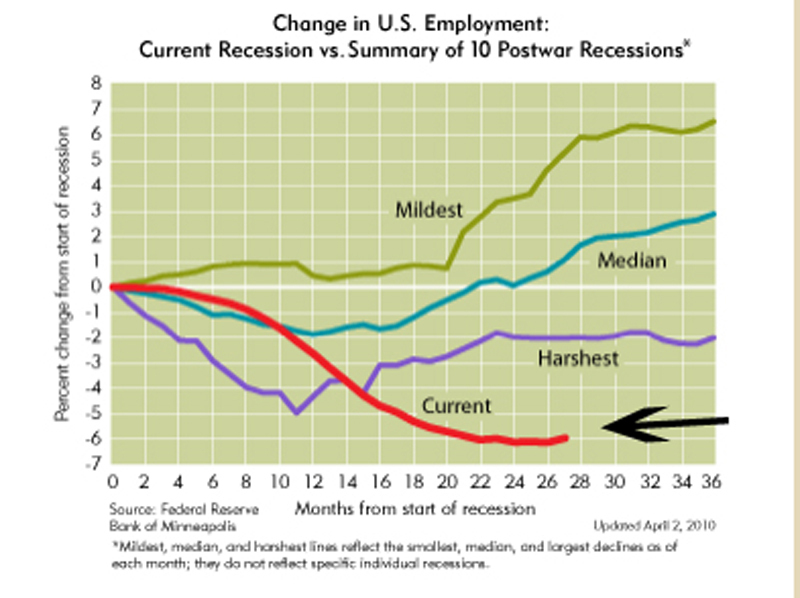
How Output In This Recession Compares To Past Recessions